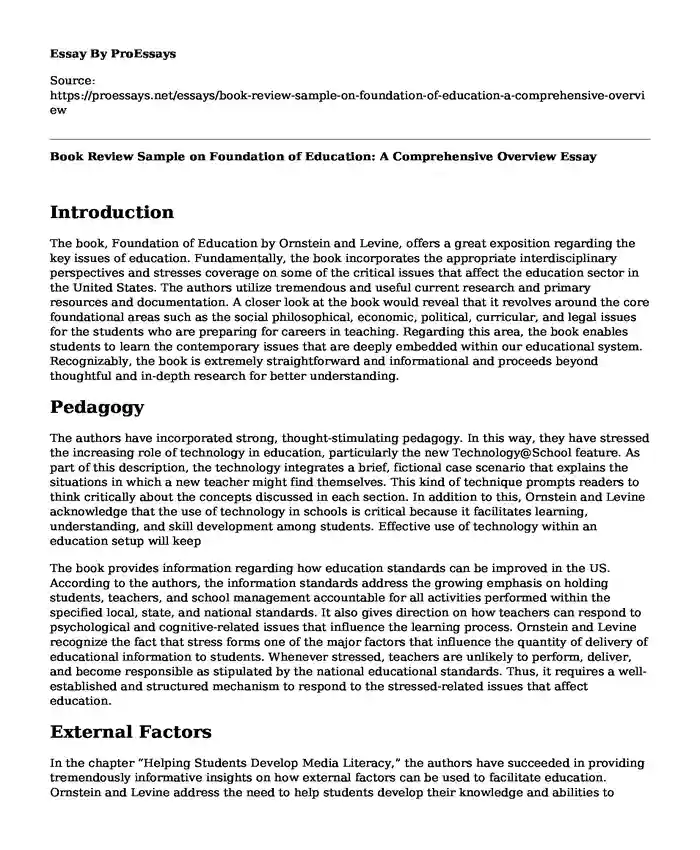Introduction
The book, Foundation of Education by Ornstein and Levine, offers a great exposition regarding the key issues of education. Fundamentally, the book incorporates the appropriate interdisciplinary perspectives and stresses coverage on some of the critical issues that affect the education sector in the United States. The authors utilize tremendous and useful current research and primary resources and documentation. A closer look at the book would reveal that it revolves around the core foundational areas such as the social philosophical, economic, political, curricular, and legal issues for the students who are preparing for careers in teaching. Regarding this area, the book enables students to learn the contemporary issues that are deeply embedded within our educational system. Recognizably, the book is extremely straightforward and informational and proceeds beyond thoughtful and in-depth research for better understanding.
Pedagogy
The authors have incorporated strong, thought-stimulating pedagogy. In this way, they have stressed the increasing role of technology in education, particularly the new Technology@School feature. As part of this description, the technology integrates a brief, fictional case scenario that explains the situations in which a new teacher might find themselves. This kind of technique prompts readers to think critically about the concepts discussed in each section. In addition to this, Ornstein and Levine acknowledge that the use of technology in schools is critical because it facilitates learning, understanding, and skill development among students. Effective use of technology within an education setup will keep
The book provides information regarding how education standards can be improved in the US. According to the authors, the information standards address the growing emphasis on holding students, teachers, and school management accountable for all activities performed within the specified local, state, and national standards. It also gives direction on how teachers can respond to psychological and cognitive-related issues that influence the learning process. Ornstein and Levine recognize the fact that stress forms one of the major factors that influence the quantity of delivery of educational information to students. Whenever stressed, teachers are unlikely to perform, deliver, and become responsible as stipulated by the national educational standards. Thus, it requires a well-established and structured mechanism to respond to the stressed-related issues that affect education.
External Factors
In the chapter “Helping Students Develop Media Literacy,” the authors have succeeded in providing tremendously informative insights on how external factors can be used to facilitate education. Ornstein and Levine address the need to help students develop their knowledge and abilities to integrate media in the classroom. The authors recognize that media literacy is more important than the ever-shifting media environment. This is particularly true regarding undergraduate students. They have little experience in learning the mechanisms of locating, evaluating, and critically analyzing the information they should be used to address the world challenges.
Finally, the book is critical in offering information regarding how students can be protected from undesirable factors and materials, and which may otherwise affect their educational achievements. The authors recognize that numerous social and political issues can influence the student’s educational attainment. These can include peer influence, social conditions, family arrangements, and school organization. They recognize that these two factors have been subjected through a continuous state of modifications. The relationship between family socioeconomic status as well as the learning outcomes of students is well-established in sociological research.
Conclusion
In my view, I believe that the authors of this book have succeeded in providing valuable insights regarding some of the foundational issues that affect the education sector. I perceive it excellent for its substantial coverage of all the foundational areas that include social, historical, political, and economical. The information contained in this case is critical in helping students to understand the key educational issues that affect the American system. Through a wide array of features, the authors have enabled students to develop a wide understanding ad vision for their careers by attempting the implement the themes presented in the theme for their effective future practice.
From the pre-service to the practice of real-world teaching scenarios, this book encourages students to establish their unique philosophy of teaching and developing a strong foundation for a lifelong career. Completely updated throughout, the authors provide the latest information on accountability, technology, diversity, and many other critical topics. Therefore, it is fair to say that the Foundations of Education is a basic book about education that includes a historical review of worldwide educational development. It covers everything that students might require or desire to know about how the education system works. Teachers can also tremendously benefit from it because of the useful information that they can find information daily. It will enable them to know how to develop and implement various elements of philosophy within the classroom. I believe that the book is a good place to begin for the people who want to get under the skin of education in the US.
Works Cited
Ornstein, Allan C., et al. Foundations of education. Nelson Education, 2016.
Cite this page
Book Review Sample on Foundation of Education: A Comprehensive Overview. (2023, Oct 12). Retrieved from https://proessays.net/essays/book-review-sample-on-foundation-of-education-a-comprehensive-overview
If you are the original author of this essay and no longer wish to have it published on the ProEssays website, please click below to request its removal:
- Due Process of Student Suspension and Expulsion: Paper Example
- How Can the Word Bank Help Solve the Issue of Literacy in Niger?
- Essay on Junk Foods Should Not Be Sold In Public Schools Vending Machines
- University of Hacettepe's Study From Classrooms Environment Paper Example
- The Significance of Direct and Indirect Definition of Masculinity and Femininity in Hamlet: Critical Essay
- Poetry Analysis Essay on Mary Oliver's Crossing The Swamp
- What Does Home Mean to Me Essay Example







